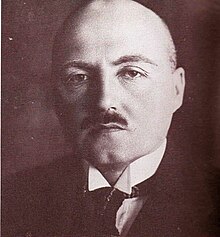Stefan Kraft (politician)
Stefan Kraft (born August 15, 1884 in Inđija / India, Kingdom of Croatia and Slavonia , Austria-Hungary ; † June 16, 1959 in Heidelberg ) was a German association functionary , national and economic politician in the Kingdom of Yugoslavia or in the " Independent State of Croatia " .
Life
Kraft grew up as the son of Danube Swabian peasant parents in the Syrmia region , which at that time belonged to the Hungarian half of the Habsburg monarchy . He studied natural sciences in Zagreb , from 1905 in Marburg an der Lahn and Vienna law and political sciences. He also did his doctorate in Vienna. As a student, Kraft campaigned for the national concerns of Germans in Hungary and Croatia. In Vienna he belonged to the circle around Adam Müller-Guttenbrunn and Edmund Steinacker and supported their political endeavors. In 1915 he passed the judge's examination in Zagreb. He then did military service in the Austro-Hungarian Army , where he rose to become captain. At the end of the First World War he joined the “German People's Council for Hungary” founded by Rudolf Brandsch and headed the branch in Novi Sad. Kraft was instrumental in the 1918 manifesto of the "Swabian National Council".
In January 1919, Kraft Stojan Protić , Prime Minister of the Kingdom of Serbs, Croats and Slovenes , presented the national wishes of the German-speaking population of the new state. The Serbian autonomy in Hungary before the war served as a model for the German autonomy approved at that time. Kraft organized the Germans settling in the country in larger and smaller groups and became chairman of the "Druckerei- und Verlags-AG" founded in Novi Sad in 1919 , which published the daily newspaper "Deutsches Volksblatt" and other publications. He was a co-founder of the Swabian-German Cultural Association and President of the German cooperative headquarters. As executive chairman of the German party founded in 1922 in Banat Žombolj with chairman Ludwig Kremling , he was a member of the national assembly as a member of parliament and political spokesman for the German minority from 1923 to 1939 . The German School Foundation, of which Kraft had been president since it was founded in 1931, was able to self-help establish the German-speaking secondary schools that were not supported by the state.
When the conflict between the moderate representatives of the Germans in Yugoslavia and the innovators captured by the National Socialists intensified, Kraft resigned from all his offices on June 30, 1939, under pressure from the German Reich government . In 1941 he was appointed State Secretary to the Ministry of Economic Affairs of the Independent State of Croatia .
As the Eastern Front of the Second World War drew closer ( evacuation of the German ethnic group from the Banat in 1944 ), Kraft managed to escape to Austria, where he held the position of chairman of the Upper Austrian Red Cross for refugee welfare. He stepped there u. a. for the admission of ethnic German children to elementary and secondary schools. Since he could not obtain Austrian citizenship , he moved to Stuttgart in 1949. The newly established compatriot of Germans from Yugoslavia elected Kraft as chairman. In this function he campaigned for the equal integration of the expelled Yugoslav Germans in the Federal Republic of Germany.
The country team described Stefan Kraft in a memorandum from 2009 as the "father of the Danube Swabians".
literature
- Fritz Wertheimer : From German parties and party leaders abroad. Berlin 1930.
- Matthias Annabring: Folk history of the Danube Swabians from Yugoslavia. Stuttgart 1955.
- Theodor Schieder (Ed.): Documentation of the expulsion of the Germans from East Central Europe. Vol 5: The fate of the Germans in Yugoslavia. Bonn 1961.
- Josef Wilhelm: India. Freilassing 1961.
- Franz Hieronymus Riedl: Southeast Germanism in the years 1918–1945. Munich 1962.
- Johann Wüscht : Contribution to the history of the Germans in Yugoslavia for the period from 1934 to 1944. Kehl 1966.
- Josef Volkmar Senz : The school system of the Danube Swabians in the Kingdom of Yugoslavia. Munich 1969.
- Valentin Oberkersch : The Germans in Syrmia, Slavonia and Croatia until the end of the First World War. Stuttgart 1972.
- Balduin Saria : Stephan Kraft and the establishment of the German-Hungarian School Foundation in 1911. In: Südostdeutsche Vierteljahresblätter, Volume 4 . Munich 1959, pp. 185-189.
- Kraft, Stephan , in: Maria Keipert (Red.): Biographical Handbook of the German Foreign Service 1871–1945. Published by the Foreign Office, Historical Service. Volume 2: Gerhard Keiper, Martin Kröger: G – K. Paderborn: Schöningh, 2005, ISBN 3-506-71841-X , p. 623
Individual evidence
- ^ Stefan Karner : Slovenia and its "Germans". The German-speaking ethnic group as a subject and an object of politics 1939 to 1998. Kulturstiftung der Deutschen Vertrieben, 2000, p. 14.
- ^ A b Thomas Casagrande: The Volksdeutsche SS-Division "Prinz Eugen". The Banat Swabians and the National Socialist war crimes . Campus Verlag, 2003, ISBN 3-593-37234-7 , p. 129
- ^ Josef Volkmar Senz : Kraft, Stefan . In: Mathias Bernath, Felix von Schroeder (Ed.), Gerda Bartl (Red.): Biographical Lexicon for the History of Southeast Europe . Volume 2. Oldenbourg, Munich 1976, ISBN 3-486-49241-1 , p. 498 f.
- ^ Johann Böhm : The German ethnic group in Yugoslavia 1918-1941. Domestic and foreign policy as symptoms of the relationship between the German minority and the Yugoslav government. Peter Lang, 2009, p. 64.
- ^ Ingomar Senz : On the 50th anniversary of the death of Stefan Kraft. Donauschwäbische Kulturstiftung, 2009.
| personal data | |
|---|---|
| SURNAME | Kraft, Stefan |
| BRIEF DESCRIPTION | Association official, ethnicity and economic politician in the Kingdom of Yugoslavia |
| DATE OF BIRTH | August 15, 1884 |
| PLACE OF BIRTH | India , Kingdom of Croatia and Slavonia , Austria-Hungary |
| DATE OF DEATH | June 16, 1959 |
| Place of death | Heidelberg |
